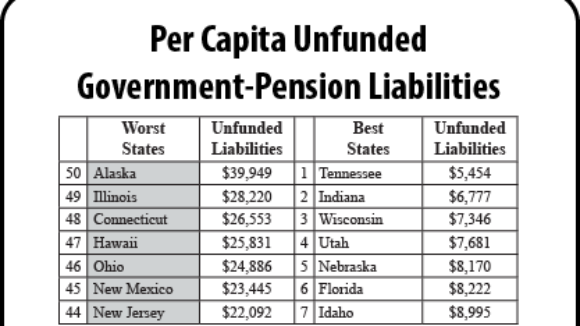Many parties share the blame for the fiscal debacle that led to Detroit’s Chapter 9 bankruptcy filing this July, which this Tuesday was approved, over union bosses’ loud and angry objects, by a federal judge.
The primary culprits are, without a doubt, the state elected officials in Lansing who granted Detroit municipal union bosses statutory monopoly-bargaining privileges in the first place, and then refused to act to revoke those special privileges even as their disastrous impact became increasingly obvious.
For decades, Michigan’s pro-union monopoly state laws made it virtually impossible for any elected official in Detroit to reform government employee compensation and work rules that were increasingly unaffordable for a city whose population was shrinking and getting poorer.
Of course, power-crazed municipal union bosses and the local politicians who typically had no interest in putting up any resistance to their outrageous demands, even had their hands not been tied by state labor laws, are also culpable.
One egregious example of anti-taxpayer collusion between government union bosses and Detroit politicians, analyzed in detail in a September 9 Detroit Free Press expose, resulted in the diversion of nearly $1 billion from the Motor City’s General Retirement System (GRS) into cash payments to unionized workers and retirees over the course of more than two decades.
As the Free Press explained, had not $951 billion in so-called “excess cash” been taken out of the GRS from 1985 to 2008 and used to furnish government workers 13 paychecks a year instead of the 12 monthly paychecks provided for by their contracts, Detroit’s budget shortfall today would be smaller by $1.9 billion.
Back in the mid-1990’s, then-Mayor Dennis Archer recognized the “13th paycheck” scheme threatened the soundness of the GRS. He backed a 1996 ballot proposition to stop it, but was thwarted by “intense union opposition,” the Free Press noted.
Even though “13th paychecks” were never authorized by union contracts, city officials eventually found out, to their dismay, that they could not stop handing them out without union officials’ acquiescence. Even after Detroit finally adopted an ordinance prohibiting this unauthorized diversion of money from the GRS in 2008, union bosses actually filed a complaint with the state labor board to try to get the ordinance overturned!
Detroit would still be in terrible shape even if the “13th check” scam had never been concocted, but it’s fair to estimate that, other things being equal, the $20 billion shortfall the city faces would be 10% smaller.
Incredibly, as financial writer Andrew Biggs pointed out on Thursday in a post for the Manhattan Institute’s Public Sector Inc. blog (see the link below), government union chiefs and their apologists still refuse to acknowledge this obvious fact. Biggs quoted from a late September op-ed by union official and pension board member John Riehl, who was directly involved in the scam:
“Some say that if the board had invested those excess earnings funds over the 23-year period, the pension fund would be in better shape today. Given the numerous factors that influence fund performance over such a long period, it’s impossible to predict whether that’s true.”
Not surprisingly, Riehl did not attempt to explain how the GRS could not be in better shape today if the $951 billion had been allowed to stay in the pension fund!
Preventing other cities from going the way of Detroit, along with protecting public servants’ freedom, is a key objective the National Right to Work Committee has in seeking repeal of all state laws authorizing public-sector monopoly unionism.


